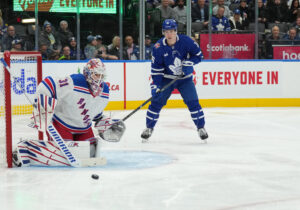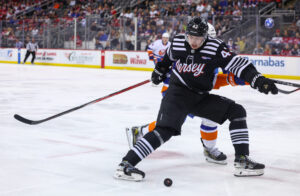The Missing Rings is a series looking at some of the best teams in NHL history to not win the Stanley Cup. Whether they lose in the first round or game seven of the finals, these great teams have been forgotten because they could not win the big one. For the first installment, the 1950-51 Detroit Red Wings are the focus.
The Missing Rings: 1950-51 Detroit Red Wings
1949-50 Season
The 1950-51 Detroit Red Wings entered the season defending Stanley Cup champions. The season prior, Detroit was the league champions, besting the second-place Montreal Canadiens by 11 points. Despite needing seven games to dispatch the Toronto Maple Leafs and New York Rangers, the Red Wings won their first Cup since 1943. Detroit seemed prime for a long run of dominance. The team had a lineup that included a slew of future hall of fame players like Gordie Howe, Sid Abel, Ted Lindsay, and Red Kelly. Also making their debuts in very limited action were Marcel Pronovost and Terry Sawchuk. Going into the 1950-51 season, a lot was expected from the Wings, and they didn’t disappoint.
1950-51 Season
The Red Wings kept rolling in 1950-51. They ran away with the league title, racking up 44 wins and 101 points in 70 games, a seven-win and 13 point improvement from the last season. Leading the way for Detroit was “Mr. Hockey” himself, Gordie Howe. Howe led the league in scoring with 86 points, 20 more than the next closest player, Maurice Richard of the Montreal Canadiens. Joining Howe in the top ten of league scoring was Abel (61 points), Lindsay (59 points) and Kelly (54 points).
Probably the biggest reason for the Red Wings strong season was rookie goaltender Terry Sawchuck. While he made his debut a season prior, he only played in 7 games. In the 1950-51 season, Sawchuk played in all 70 games. He posted a 44-13-13 record with 11 shutouts and a 1.97 goals-against average. Sawchuk won the Calder Trophy as rookie of the year. In one of the all-time snubs, however, he was passed over for the Vezina Trophy in favour of Toronto’s Al Rollins.
When all was said and done, the Red Wings won the league title and had the Art Ross Trophy winner (Howe), Calder Trophy winner (Sawchuk), and Lady Byng Trophy winner (Kelly). They had four first-team all-stars and were the first team to ever crack the 100 point plateau. The Wings seemed on the cusp of a dynasty.
What Went Wrong
Going into the playoffs, it seemed determined that the Wings would face the Maple Leafs in the finals. Toronto finished second overall with 95 points, 30 points ahead of third-place Montreal. Because the playoff format was first plays third, second plays fourth, Detroit was playing Montreal in the first round.
Detroit dominated the Habs during the season, posting a 9-3-2 record. That included an 8-1 and 7-1 drubbing as well as a 5-0 win in their final game of the regular season. Detroit was expected to cruise, unfortunately for the Wings it was not to be.
Montreal took the first two games, in Detroit, in a couple of overtime thrillers. Game one needed quadruple overtime before a Rocket Richard goal gave the Habs a 3-2 decision. Game two needed triple overtime before the Rocket again scored the winner in a 1-0 Habs win.
Despite this early hole, the Wings were resolute and battled back. They got a 2-0 win in game three in Montreal. Now, back in the series, Detroit looked for more. Game four in Montreal saw the Wings even the series with a 4-1 win. Heading back to the Olympia after tying up the series, Detroit was, again, expected to roll.
In game five, they jumped out to a 2-0 first-period lead. Then the wheels fell off. Montreal scored three in the second period and two more in the third to take game five 5-2. It also gave the Habs a chance to close out the series at the Forum. Close it out they did, with a 3-2 decision. That was it, Detroit’s dream of repeating as Stanley Cup champions was over.
Aftermath
The immediate aftermath saw the Leafs and Canadiens meet in the finals. Toronto made quick work of Montreal, winning the series and Cup in five games. For Detroit, a long summer of “what if’s?” must have swirled in their heads. Such a dominant team, yet they have nothing to show for it.
Still, it’s not all doom and gloom for Detroit in the ’50s. The Wings would win the Cup the following season and two more times again. In total, Detroit would win four Cups in six seasons between 1950-1955. Still, the 1950-51 season was their best of the decade for Detroit but was unable to cap off the season they way they hoped.
Had Detroit been able to win the Cup, they would be considered one of the greatest dynasties in hockey history, winning five Cups in six years, including three in a row from 1950-52.






